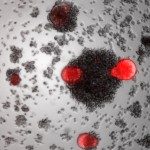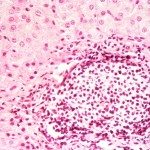Link to Pubmed [PMID] – 23342031
PLoS ONE 2013;8(1):e53881
The capacity of a virus to cross species barriers is determined by the development of bona fide interactions with cellular components of new hosts, and in particular its ability to block IFN-α/β antiviral signaling. Tioman virus (TioV), a close relative of mumps virus (MuV), has been isolated in giant fruit bats in Southeast Asia. Nipah and Hendra viruses, which are present in the same bat colonies, are highly pathogenic in human. Despite serological evidences of close contacts between TioV and human populations, whether TioV is associated to some human pathology remains undetermined. Here we show that in contrast to the V protein of MuV, the V protein of TioV (TioV-V) hardly interacts with human STAT2, does not degrade STAT1, and cannot block IFN-α/β signaling in human cells. In contrast, TioV-V properly binds to human STAT3 and MDA5, and thus interferes with IL-6 signaling and IFN-β promoter induction in human cells. Because STAT2 binding was previously identified as a host restriction factor for some Paramyxoviridae, we established STAT2 sequence from giant fruit bats, and binding to TioV-V was tested. Surprisingly, TioV-V interaction with STAT2 from giant fruit bats is also extremely weak and barely detectable. Altogether, our observations question the capacity of TioV to appropriately control IFN-α/β signaling in both human and giant fruit bats that are considered as its natural host.



